Stay In Touch!
Sign up for occasional email updates about upcoming events, volunteer & job opportunities, farm happenings, and more.
Unadilla Community Farm is an off-grid, solar-powered, non-profit farm education center, situated on 11 acres in West Edmeston, NY. Founded in 2014 by millennial first-generation farmers who met through the WWOOF network, Unadilla Community Farm incorporated as a 501(c)3 non-profit organization in 2020.
Our mission is to showcase and teach climate-resilient agriculture while increasing food access and access to herbalism for low-income, low-access communities.
What is a community farm?
Many people are familiar with the term ‘community garden,’ which, as defined by USDA, is a collaborative project on a shared open space where participants share in the maintenance and products of the garden, including healthful and affordable fresh produce. As a community farm, we are implementing this concept at scale, engaging dozens of volunteers throughout the season from the communities we serve through our Community Volunteer Days. Volunteers assist with production while learning sustainable farming techniques that are efficient and economical. Similar to a community foundation, which is publicly funded and serves the local community, Unadilla Community Farm is a publicly funded 501(c)3 non-profit that serves the regional community in Central NY State, through its Education & Research, Food Access, and Herbal Aid Programs.
Our vision for a sustainable future.
Sustainability is our common ideal, guiding us in all of our actions. It’s the ability to look beyond our immediate desires, to look deeper inside ourselves, farther into the future, and consider the long-term implications of our actions. Viewing our work through the lens of sustainability pushes us to consider the enduring well-being of everyone and everything on the planet. Our work focuses on developing and sharing skills and products that move us towards this ideal. The community farm provides a space where we can pour our creative energies and manifest our common vision of a sustainable community free from the stresses of mainstream society, where we can participate in and learn about an alternative way of life. It’s a place for sharing knowledge about the practices we follow, the products we offer, and through events, classes, and our fellowship program.
The Unadilla River, which runs alongside our farm, gets its name from the indigenous Oneidan word for “a meeting place.” And at its very core, Unadilla Community Farm is just that – a place for people to come together, learn valuable skills from one another, and celebrate our togetherness with each other and with the natural world.
Unadilla Community Farm is a co-founder & co-organizer of the Leatherstocking Farmers Network, which consists of over 60 members representing farmers, ranchers, food business owners, and ag agencies in the Greater Otsego “Leatherstocking” Region of New York (within a ~50 mile radius of Cooperstown).
Additionally, Unadilla Community Farm is represented by our board and staff on a number of agricultural advisory committees in the region, including:
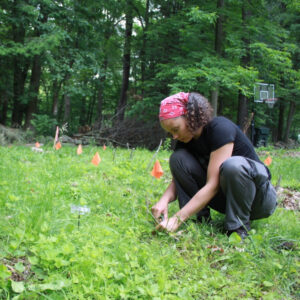
Nina Buxenbaum was born and raised in Brooklyn, NY to a politically active, multi-racial household. She received her MFA degree in painting from the Maryland Institute College of Art and her BFA from Washington University in St. Louis in drawing and printmaking. Ms. Buxenbaum has been an artist and educator for her entire career. First certified as a K-12 Art teacher in New York, she has been teaching at the college level since 2001. She is a Tenured Professor of Painting at York College, CUNY as well as a member, and current faculty, at The Silvermine Artist Guild in New Canaan, CT, and Adjunct Art Faculty at Western Connecticut State University. As an exhibiting professional artist Ms. Buxenbaum has participated in residencies at the Cité Interational des Artes in Paris, France, the Skowhegan School of Painting in Skowhegan Maine, The Artists Alliance in New York, the Byrdcliffe Artist In Residence, NY, The Vermont Studio Center in Johnson, VT, and The Hambidge Center for The Arts in Rabin Gap, GA. Her work has been included in several exhibitions including the Studio Museum of Harlem (NYC, NY), Samson Projects (Boston, MA), the Kentler International Drawing Space (Brooklyn, NY), the Ingalls Gallery (Miami, FL), Rush Arts (NYC, NY), Stella Jones Gallery (New Orleans, LA), and Galerie Myrtis (Baltimore, MD). Her work has also been featured in the International Review of African American Art, and in an Emmy nominated documentary series entitled Shades of US. She and her husband, Roberto Zapata, have been building a Food Forest and hosting classes at their home and have begun a larger scale project at York College, in Jamaica, Queens.
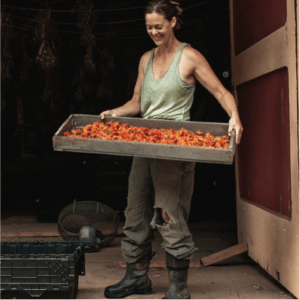
Tianna has been farming in the Northern Catskills for over a decade. Currently, Tianna, Amanda Wong and Walter Riesen own and operate Star Route Farm, LLC. For the last few years, Star Route has transitioned our diversified vegetable and small grain farm into a Food Sovereignty project fundraising to grow food for and with local pantries and Food Justice Organizations in NYC. Concurrent with Star Route, Tianna also founded and manages THE 607 CSA, a 800+ person multi-farm Community Supported Agriculture Project supporting 42 farms in Otsego, Schoharie, and Delaware counties. Tianna sits on the Board of the Center for Agricultural Development and Entrepreneurship, the Watershed Ag Economic Viability Committee, and Congressman Delgado’s Agriculture Advisory Committee. She started the Catskills Chapter of the National Young Farmers’ Coalition. She is also a founding member of Delhi’s Bushel Collective and the Schooner Apollonia, a Hudson Valley Sail Freight venture.
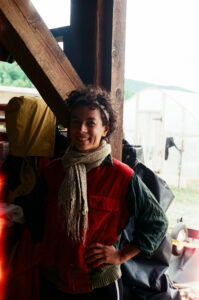
When Greta's not out in the field or teaching a class on grassroots organizing, you can find her checking the farm's inbox, writing grants, updating our website, and doing all things admin. Prior to joining Unadilla Community Farm, Greta worked and WWOOFed at organic farms and vegan retreat centers across North America. She also previously worked as New York Organizer for Food & Water Watch, campaigning on issues related to fracking, genetically engineered foods, climate change, and the corporate control of our common resources. In addition to her current work with Unadilla Community Farm, she is the Organizing Director for World BEYOND War, a global anti-war non-profit.
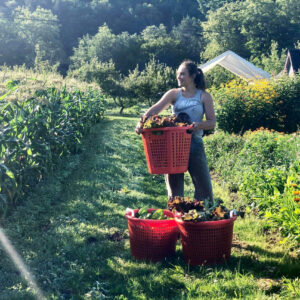
Bari Zeiger is a young farmer and community organizer. Currently, Bari is the Director of Development and Administration at Providence Farm Collective, a Western NY organization centering the actualization of immigrant and refugee food sovereignty through nurturing access to farmland and fresh, culturally relevant foods alongside peer-to-peer education. Bari is the Farmer Representative of NE SARE's Administrative Council, as well as a grant reviewer for the New England Grassroots Fund. She has participated on the National Young Farmers Coalition Ad Hoc Federal Policy Setting Process Committee and currently acts on the Federal Policy Committee as the Women Affinity Representative. Bari is a member of the Finger Lakes Permaculture Institute’s Board of Directors. While earning a degree in Philosophy and Environmental Studies at SUNY Geneseo, Bari interned on a local, certified organic family farm and engaged peers through organizing on-farm volunteer events and on-campus panel discussions related to sustainable food systems. In her final semester, she conducted a Directed Study on the role of structural violence in the U.S. migrant farm labor system, participated in grassroots activism as an ally for migrant dairy workers in Western NY, and co-founded the Student Coalition for Migrant Workers. After graduating in December 2016, Bari moved to the North Carolina Foothills to serve as an apprentice at A Way of Life Farm and was involved in all aspects of commercial, diversified vegetable, herb, and fruit production, as well as the silvopasture hog operation. Thereafter, Bari managed the farm at Frost Valley YMCA optimizing and expanding production, educational programs, and community relationships. In 2020, Bari began the process of building her own agricultural small business, Healing Poem Farm, in Java, NY, outside of the city of Buffalo.
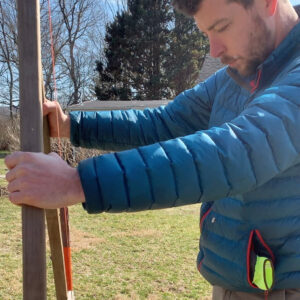
A practitioner of permaculture and owner and manager of Let it Grow Landscapes, Vic Ziminsky creates and installs edible and ecological landscape design plans for community and home gardens. He became certified to practice permaculture design through the Center of Bioregional Living, in New York City. Let it Grow Landscapes is an Organic Landcare company, certified by NOFA-CT. Vic studies at the New York Botanical Gardens School of Horticulture and Landscape Design. He taught English in Chile and studied creative writing at Binghamton University. Vic has been practicing sustainable agriculture and permaculture, professionally as Let it Grow Landscapes, since 2014. Prior to that, with his family, he employed permaculture practices at their home garden. After becoming passionate about local, sustainable food production, he left a career in the financial industry to devote himself to caring for the land.and practiced farming, particularly as a volunteer for the Food Bank of Westchester. Currently, Vic works with individuals and organizations to better take care of nature, build community, and to realize a perennial return of bountiful food and beauty in our ecosystems.
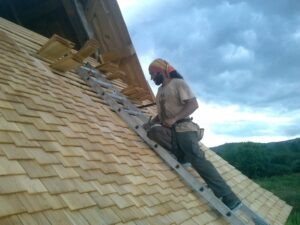
Roberto Zapata: “Unadilla, the home where my heart grew. You held my hand through a tough transformation. Thank you!” Born in Norwalk, CT, Roberto Zapata is a first generation son of Mayra, from Costa Rica, and the late Roberto Zapata Sr., from Colombia. At a very young age Roberto learned how to work with his hands. He has had a long history of wood working and construction. Roberto is a passionate builder, designer, and creator. He apprenticed with an arborist for three years. During this time he learned rigging, SRT climbing, and proper tree pruning. He has independently pursued the study of tree, plant, and mushroom medicines. In 2015 Roberto started a community garden project, Meadows Garden Pride, in the public housing complex where he lived. Through the use of Hügelkultur he created garden beds that required no tilling, fertilizing, or irrigation, thus eliminating many inputs. From 2017-2018 Roberto led campers ages 8-18, and adults of all ages, in foraging, plant identification, and medicinal plant harvesting classes at Holmes Camp & Retreat Center. In 2018 he earned his permaculture certification. Roberto desires to restore land to a place of abundance, not just for people, but for all living beings. Roberto embraces diversity, letting go of ego, and aspires for all people to understand that we all are part of this ecosystem; that Planet Earth, and all the siblings, are our responsibility. Roberto believes in freeing ourselves to begin healing, and surrounds himself with others looking to provide this healing work, and more, for the land. La Jolie Journet is a mobile community outreach program that Roberto, along with Nina Buxenbaum, are currently building, and invite all those interested to link up.
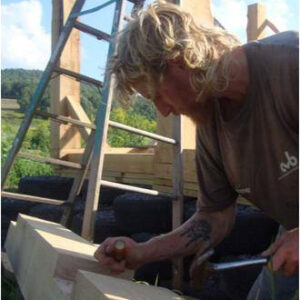
Ben has over a decade of experience in permaculture design, sustainable housing, organic farming, and community development projects. He has worked with local governments, NGOs, non-profits, organic farms, and intentional communities in North America, Latin America and Europe, and teaches permaculture design certification courses, natural building workshops and organic farming seminars. You can read more about Ben's previous natural building projects on his blog, Ben's Natural Building.

Yelena was born and raised in Ukraine and moved to the US in 2015. With a BA in Journalism and an MA in TV & Cinema Studies, she acquired a versatile professional background in broadcasting, filmmaking, media production, and digital marketing. During 2022-2023, Yelena volunteered and worked with the nonprofit Razom for Ukraine. After spending 2 months in her home country torn by the war, she created a vision for how she can help her people. "There will be a time when the war is over and we will need to rebuild the country. When that time comes, I want to create an off-grid holistic living center focused on trauma healing, sustainability, and zero-waste principles that will offer rehabilitation programs for children." To develop her vision further, she's currently focusing on learning permaculture, off-grid systems, and natural building.
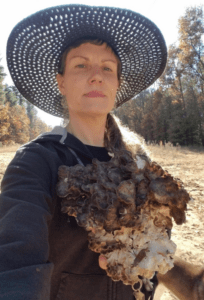
Dacia (rhymes with Echinacea) loves the natural world and focuses her attention towards all that is sacred. As a retired organic vegan chef of 20 years, she now spends her time feeding the soil and designing beautiful environments that create habitat and nourishment for all relations. Herbalism, eating wild foods, dancing with the moon, fermentation, natural building, and veganic permaculture are also important to her. As a recent transplant from the Midwest, she looks forward to growing her roots and community in this new place called home.

Growing up as a homeschooler in the hilltowns of western Massachusetts, Carina always loved learning and working outside. When she was 16, she took a sustainable agriculture class offered at a local community college, which sparked her interest in growing vegetables and herbs in a regenerative manner. She specifically became interested in how to make fresh produce available to people living in food deserts. After that class, she started working on a local homestead. She has learned and worked on a number of farms around her home, and completed Unadilla Community Farm’s Permaculture Internship in 2022. Carina also recently went through a shortened associate's degree program, and received a certificate in digital photography. If you are looking for her, she is probably outside in a field, barefoot, with a camera in her hands.
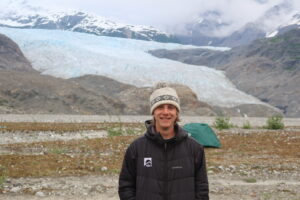
Joey Roberts grew up 30 minutes north of Unadilla Community Farm in New Hartford, NY. Currently studying Environmental Studies at SUNY Environmental Science and Forestry in Syracuse, NY, he has a strong interest in sustainable agriculture and environmental education. This interest was sparked at the end of his senior year of high school when he decided he would grow a garden from scratch as a learning opportunity to understand how to grow food. Every summer since he’s been able to get his hands dirty growing food in some capacity and he is excited to work with the welcoming people of Unadilla Community Farm this season. Ultimately, Joey is excited to learn as much as he can because he sees sustainable agriculture as one of the most impactful tools toward improving many of the environmental and societal issues we face.
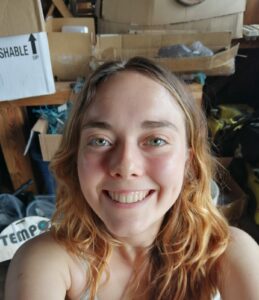
Louise is a French student interning at Unadilla Community Farm for the summer. She is a master's student at University of Purpan, an engineering school specialised in agriculture and agronomy in southern France. She wants to be a farmer later so she came to the farm to learn more about permaculture, organic market gardening, and off-grid life. She has been working in the field for two years now, trying to discover the secrets of plants, the soil, insects, and wildlife. She is also really motivated to learn more about American culture! It is her first trip to the U.S. and she would love to know what Americans like to eat, to drink, to listen to, what are the great things to do here, and the nice hikes nearby. She will always be ready for a fun little trip to discover new things.
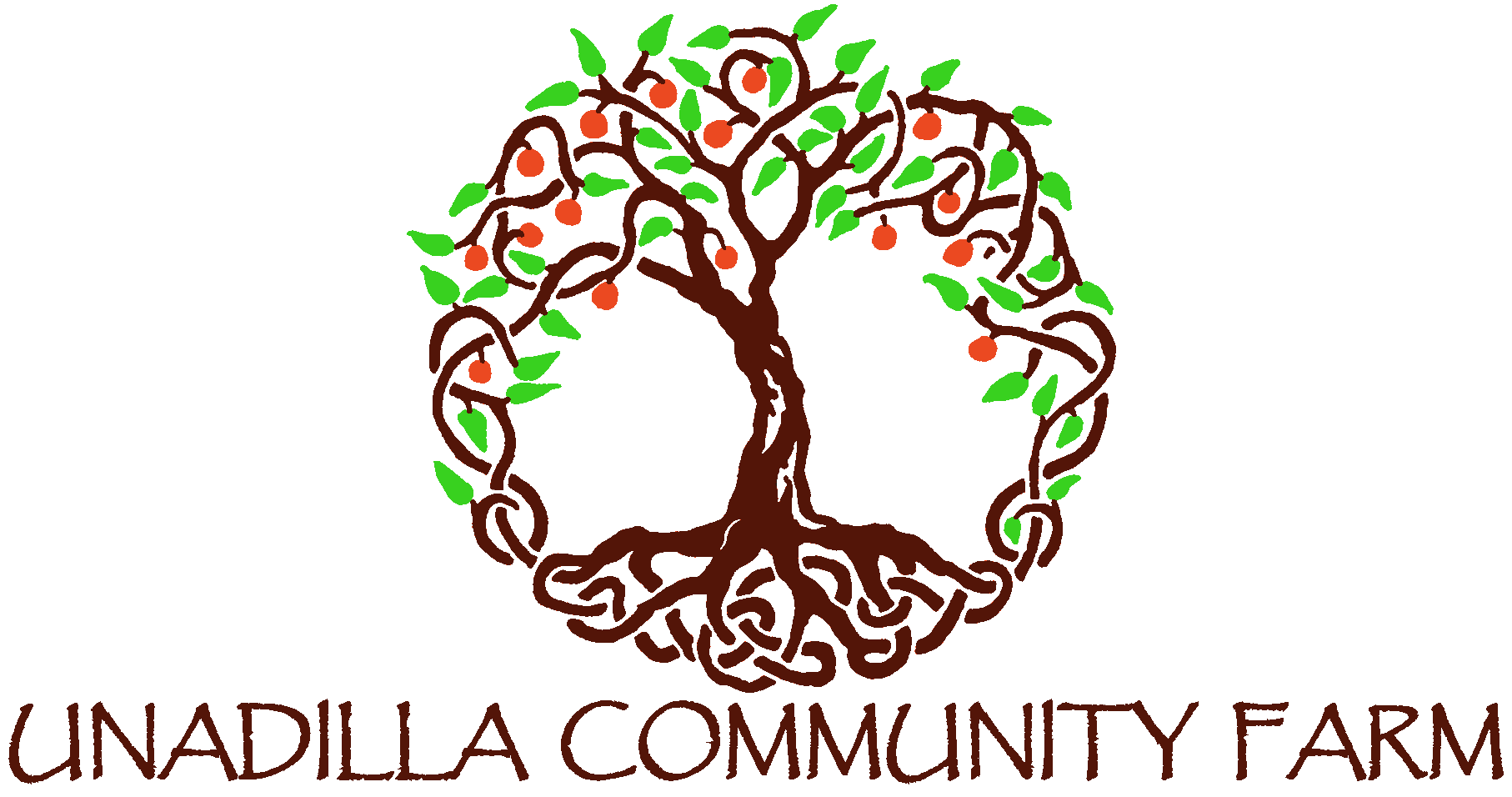
Sign up for occasional email updates about upcoming events, volunteer & job opportunities, farm happenings, and more.